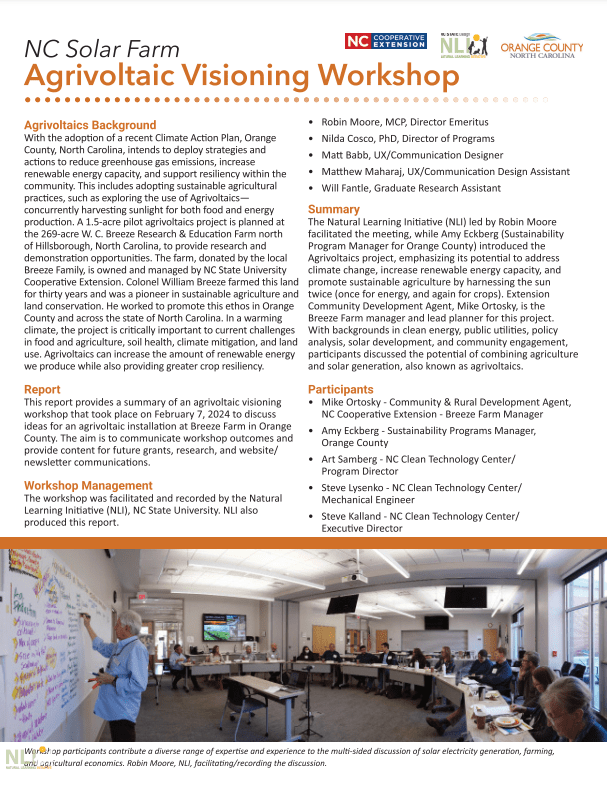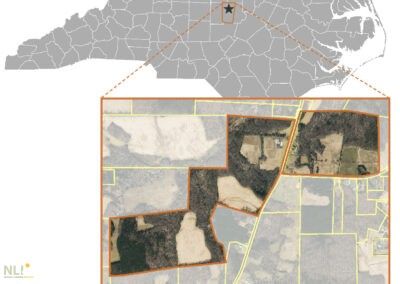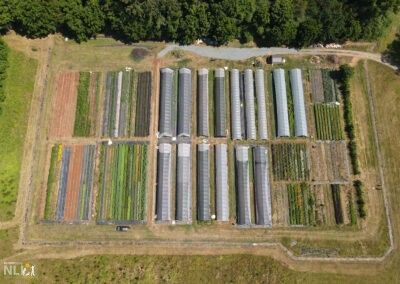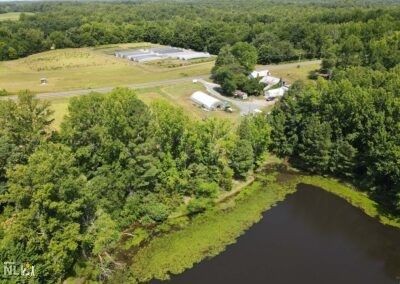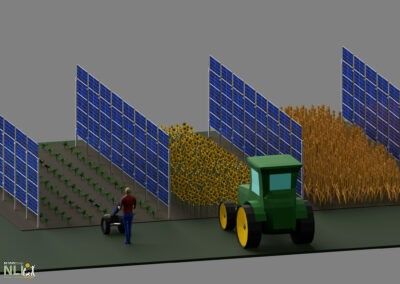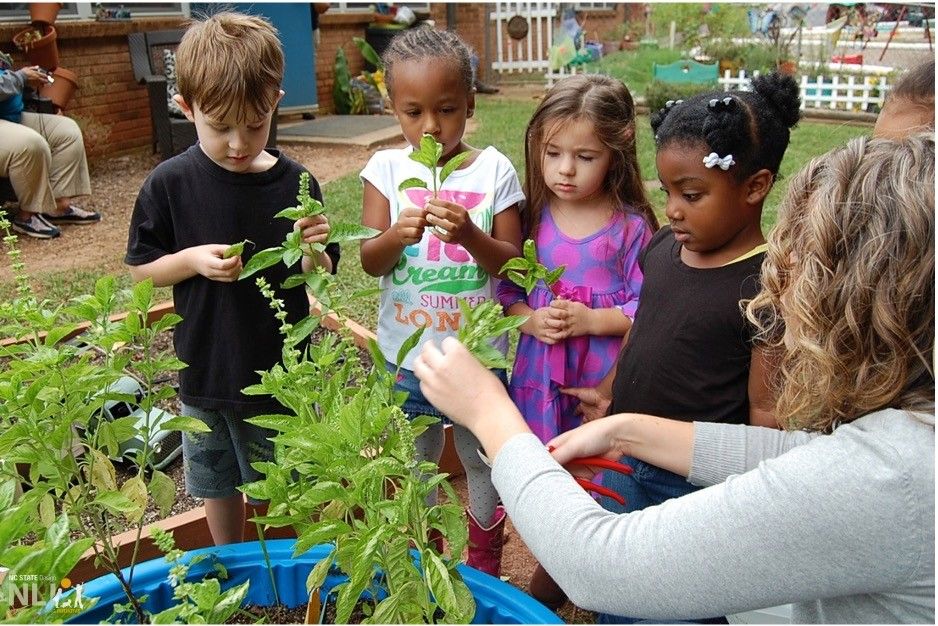NC Solar Farm: Agrivoltaics Project
Agrivoltaics Background
With the adoption of a recent Climate Action Plan, Orange County, North Carolina, intends to deploy strategies and actions to reduce greenhouse gas emissions, increase renewable energy capacity, and support resiliency within the community. This includes adopting sustainable agricultural practices, such as exploring the use of Agrivoltaics—concurrently harvesting sunlight for both food and energy production. A 1.5-acre pilot agrivoltaics project is planned at the 269-acre W. C. Breeze Research & Education Farm north of Hillsborough, North Carolina, to provide research and demonstration opportunities. The farm, donated by the local Breeze Family, is owned and managed by NC State University Cooperative Extension. Colonel William Breeze farmed this land for thirty years and was a pioneer in sustainable agriculture and land conservation. He worked to promote this ethos in Orange County and across the state of North Carolina. In a warming climate, the project is critically important to current challenges in food and agriculture, soil health, climate mitigation, and land use. Agrivoltaics can increase the amount of renewable energy we produce while also providing greater crop resiliency.
Report
This report provides a summary of an agrivoltaic visioning workshop that took place on February 7, 2024 to discuss ideas for an agrivoltaic installation at Breeze Farm in Orange County. The aim is to communicate workshop outcomes and provide content for future grants, research, and website/newsletter communications.
Summary
The Natural Learning Initiative (NLI) led by Robin Moore facilitated the meeting, while Amy Eckberg (Sustainability Program Manager for Orange County) introduced the Agrivoltaics project, emphasizing its potential to address climate change, increase renewable energy capacity, and promote sustainable agriculture by harnessing the sun twice (once for energy, and again for crops). Extension Community Development Agent, Mike Ortosky, is the Breeze Farm manager and lead planner for this project. With backgrounds in clean energy, public utilities, policy analysis, solar development, and community engagement, participants discussed the potential of combining agriculture and solar generation, also known as agrivoltaics.
Key Considerations
- Potential application of vertical, articulating, bi-facial, and fixed solar panels in agriculture, highlighting their ability to maximize energy production and minimize panel heating.
- Need for research collaboration between solar and agricultural experts to optimize panel design and placement for different farming needs, considering factors such as shading, crop production, and energy demand on the farm.
- Potential impact of solar panel installation on erosion, stormwater management, and rain capture.
- Impact of solar panel installation on growing environment (e.g. ambient air temperature and humidity, soil temperature, available water capacity, soil carbon, soil biota, and general soil health).
- Considerations for energy consumption and distribution on the farm, including the possibility of utilizing solar energy on-site or selling it to offsite entities.
- Interest from agricultural communities, such as poultry farmers, in installing solar panels behind the meter for on-site use.
- Concerns related to zinc leaching (peanut vulnerability) and PFAS contamination in agricultural soils. Research in this space is needed to provide clarity given the prevalence of misconceptions and misinformation.
- Concerns related to the compaction of soils concerning the installation of solar.
- The demonstration site at Breeze Farm will showcase agrivoltaics and educate the Orange County Ag Community as well as across the state of NC.
- Concerns about taking agricultural land out of production for solar projects must be addressed to gain support from farmers and policymakers. Can combat this by communicating benefits like soil moisture retention and potential cost savings on irrigation.
- A possible unintended consequence of increased public interest in the farm for events like weddings and music and farm access.
- Potential funding opportunities include grants from USDA and NCDOT, private donors/alumni, collaboration with educational institutions and the military, and co-ops/small businesses.
- Idea of setting up an eco-community with separate solar arrays for homeowners and farmers.
- Potential partnerships with Jack’s Solar Farm, or NCSU’s “Controlled Environment Ag Coalition.”
- The project aligns with the county’s climate action goals.
- Additional information from the USDA and Dept. of Energy.
Research & Education
- Large-scale crop production alongside solar panels (with attention to regional differences).
- Integration of technology for interactive educational experiences.
- Potential partnership with higher education institutions for applied research and hands on learning.
- The importance of understanding the impact of solar panels on soil temperature and crop growth.
- Develop an Agrivoltaics “playbook.”
Grazing Options for Solar Panels
- Grass growth is very high in the southern states. Grazing with small ruminants helps in the maintenance of vegetation; particularly where the installation involves shorter panel supports; that could get high enough to shade panels.
- Sheep are preferred over goats and cows for vegetation management under solar panels due to low maintenance, but there is a limited market for sheep in the USA.
Considerations for Visitors
- Need for a comprehensive approach to educational visitation and research integration.
- Paved paths, designated parking, and self-guided interpretive signage to facilitate educational tours.
- Need for staff at the demo site; especially during events.
- Demonstration area is key for farmers.

Key Questions
- What crops are best suited for growth around solar panels, and how can they be effectively managed?
- How can grazing be integrated with solar panels, and what are the challenges?
- What research is needed to understand the impact of Agrivoltaics on energy production and crop yield?
- What are the best options for solar panel design to maximize agricultural production?
- What are the energy demands and usage patterns on farms, and how can solar energy be effectively utilized?
- What are the effects of climate change on agriculture and how can solar help mitigate these effects?
- How can a demonstration site best educate and inform visitors about solar and agriculture?
- What are the potential funding sources for this project?
- What would the pitch look like for funding outside of a formal grant application?
- What is the economics/value for farmers?
Action Items
Tim Fratta
- Research the potential for funding from the USDA REAP program and other sources.
Mike Ortosky
- Research the potential for scaling up the project and the associated costs.
- Seek out information about the Environmental Enhancement Grant.
- Collaborate with Central Pines Regional Council on the possibility of identifying grants and supporting grant writing.
County Extension and Sustainability
- Engage Piedmont Electric for input and collaboration
- Research potential funding sources and write a grant proposal.
- Come up with a draft research plan for comments, not for final decision, and will reach out to Piedmont Electric to identify funding sources.
- Research existing literature and reach out to authors for funding sources.
County Extension
- Reach out to the university for support and collaboration.
Agricultural Researcher
- Research the impact of solar projects on soil and crop growth.
- Research the best crops for growth under solar panels and their management.
- Gather more data on potential soil contamination coming off of solar panels.
Energy Consultant
- Explore options for behind-the-meter solar energy usage and assess the demand for solar energy on farms.
- Explore the possibility of having both front-of-meter and behind-the-meter solar panel systems for research.
- Investigate the value of battery storage for Agrivoltaics.
- Conduct feasibility research with the utility to ensure there are no upgrades needed to the grid before building the system.
Grazing Expert
- Investigate the feasibility of integrating grazing animals with solar panels and develop an implementation plan.
NC Clean Tech Center
- Research the use of different materials for solar panels to accommodate agricultural needs.
Solar Panel Designer
- Research and design different solar panel setups to maximize agricultural production.
Data Analyst
- Collect and analyze data on energy demand and usage patterns on farms to determine the potential for solar energy utilization.
Participants
- Mike Ortosky – Community & Rural Development Agent, NC Cooperative Extension – Breeze Farm Manager
- Amy Eckberg – Sustainability Programs Manager, Orange County
- Art Samberg – NC Clean Technology Center/Program Director
- Steve Lysenko – NC Clean Technology Center/Mechanical Engineer
- Steve Kalland – NC Clean Technology Center/Executive Director
- Rebekah de la Mora – Senior Policy Analyst, NC Clean Technology Center
- Dr. Amy Cooke – Director of Undergraduate Studies, Environment, Ecology & Energy Program UNC
- Kara Gravinese – Innovation and Business Development Analyst, NC Electric Cooperatives
- Timothy Fratta – Celtis Energy Advisors, Managing Partner
- Jonathon Smith – Cooperative Extension Director, Orange County
- Pat Mallett – Planning and Inspections Deputy Director, Orange County
- Kristin Prelipp – Communications Manager and Public Information Officer, Orange County
- Keith Larick – Natural Resources Director, NC Farm Bureau Federation
- Amanda Garner – Assistant Director, Economic Development, Orange County
Workshop Management
The workshop was facilitated and recorded by the Natural Learning Initiative (NLI), NC State University. NLI also produced this report.
Robin Moore, MCP, Director Emeritus
Nilda Cosco, PhD, Director of Programs
Matt Babb, UX/Communication Designer
Matthew Maharaj, UX/Communication Design Assistant
Will Fantle, Graduate Research Assistant
Contact Information
- Mike Ortosky – Community & Rural Development Agent, NC Cooperative Extension, Orange County, North Carolina jmortosk@ncsu.edu
- Amy Eckberg – Sustainability Programs Manager, Orange County North Carolina sustainablity@orangecountync.gov

